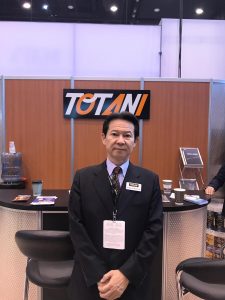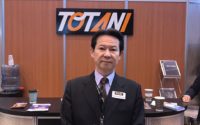 Vikram Fotedar (VF): Let me begin with stand-up pouch. Very successful as it is but how do you see the market in the future between pre-formed bags versus bags for FFS? Which do you see growing faster in the future?
Vikram Fotedar (VF): Let me begin with stand-up pouch. Very successful as it is but how do you see the market in the future between pre-formed bags versus bags for FFS? Which do you see growing faster in the future?
Tokshio Yamakushi (TY): In my opinion, it’s 50-50. Both are growing equally. As for small quantities and eye-catching packages, these can be done more and more by pre-formed pouches. To reduce the costs with the same packaging style and same material, printing and so on, then the FFS (form-fill-seal) is a better choice. To get an eye-catching package for consumer interest, it’s the pre-formed package, which may cost a little more.
VF: These days a lot of brand owners are talking about “circular economy”. What is your take and how is Totani preparing for it? Have you seen successful cases in the industry?
TY: In any case, we have to consider more and more eco-friendly packages.At the same time, we need to think about food waste. To be able to be a part of the circular economy we need to have more eco-friendly sustainable materials for packaging. In case of PE and PP materials, we expect further barrier coatings enabling further longer shelf life.
VF: Japan has always been at the forefront of innovation in packaging. The Japanese have always been heavy on packaging to an extent that some may consider that there’s a lot of over packaging. What’s your take on that? Are there any changing trends in terms of packaging in Japan?
TY: One of the most important things is material – chemicals, coatings, and adhesives; Innovations in these have always been toward sustainability. At the same time, we need to also be very creatively eco-friendly.
VF: Another important event that’s happened recently, which is influencing the dynamics of the Asian market and the American market, is the trade war that’s happening between China and the US. How do you think its affecting the packaging industry and the companies involved in this industry?
TY: It really needs to be solved immediately as it is having a global effect. For example Walmart, they import more than 10% of America’s consumption of Chinese-made products. So this is not only a problem between China and the US, the American companies are also suffering.At the same time, China also needs to be stopped from copying patents. Our company’s patents have also been infringed by some of our Chinese competitors. I hope there’s an amicable and quick solution to stopping this trade war.
VF: One of the things that would interest the Middle East and Africa readers is, Totani’s plans for the Middle East and Africa? Would you be very active in this region?
TY: It’s a difficult question. Our philosophy is to maintain a long-term relationship. So retaining our existing customers is priority while we also have goals of spreading out to find new customers. We are very keen to have repeat orders and to keep our existing customers happy with our technology. That helps us grow. So rather than searching for new markets for us, it’s important to keep our existing customers and help them grow. But definitely, Middle East and Africa is a growing market and we need to watch. Once we get some good customer we can definitely support.
VF: Do you have any other information or message that you would like to share with our readers about our experience that I can mention?
TY: Our machine reduces material waste. It also offers high-productivity and high-quality of pouches. Nowadays, especially in the Japanese market, we have lack of manpower and skilled operators. So, more and more, we have to make our machines automated.



